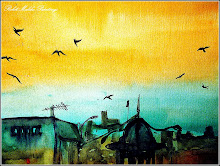The era of insults !
These glorious insults are from an era when cleverness with words was
still valued, before a great portion of the English language got
boiled down to 4-letter words!
The exchange between Churchill & Lady Astor: She said, 'If you were
my husband I'd give you poison,' and he said, 'If you were my wife,
I'd drink it.'
A member of Parliament to Disraeli: 'Sir, you will either die on the
gallows or of some unspeakable disease.' 'That depends, Sir,' said
Disraeli, 'on whether I embrace your policies or your mistress.'
'He has all the virtues I dislike and none of the vices I admire.' -
Winston Churchill
'A modest little person, with much to be modest about.' - Winston Churchill
'I have never killed a man, but I have read many obituaries with great
pleasure.' - Clarence Darrow
'He has never been known to use a word that might send a reader to the
dictionary.' - William Faulkner (about Ernest Hemingway).
'Poor Faulkner. Does he really think big emotions come from big
words?' - Ernest Hemingway (about William Faulkner)
'Thank you for sending me a copy of your book; I'll waste no time
reading it.' - Moses Hadas
'I didn't attend the funeral, but I sent a nice letter saying I
approved of it.' Mark Twain
'He has no enemies, but is intensely disliked by his friends.' - Oscar Wilde
'I am enclosing two tickets to the first night of my new play; bring a
friend.... If you have one.' - George Bernard Shaw to Winston
Churchill
'Cannot possibly attend first night, will attend second... If there is
one.' - Winston Churchill, in response.
'I feel so miserable without you; it's almost like having you here.' -
Stephen Bishop
'I've just learned about his illness. Let's hope it's nothing
trivial.' - Irvin S. Cobb
'He is not only dull himself, he is the cause of dullness in others.'
- Samuel Johnson
'He is simply a shiver looking for a spine to run up.' - Paul Keating
'There's nothing wrong with you that reincarnation won't cure.' Jack E. Leonard
'They never open their mouths without subtracting from the sum of
human knowledge.' - Thomas Brackett Reed
'In order to avoid being called a flirt, she always yielded easily.' -
Charles, Count Talleyrand
'He loves nature in spite of what it did to him.' - Forrest Tucker
'Why do you sit there looking like an envelope without any address on
it?' - Mark Twain
'Some cause happiness wherever they go; others, whenever they go.' -
Oscar Wilde

